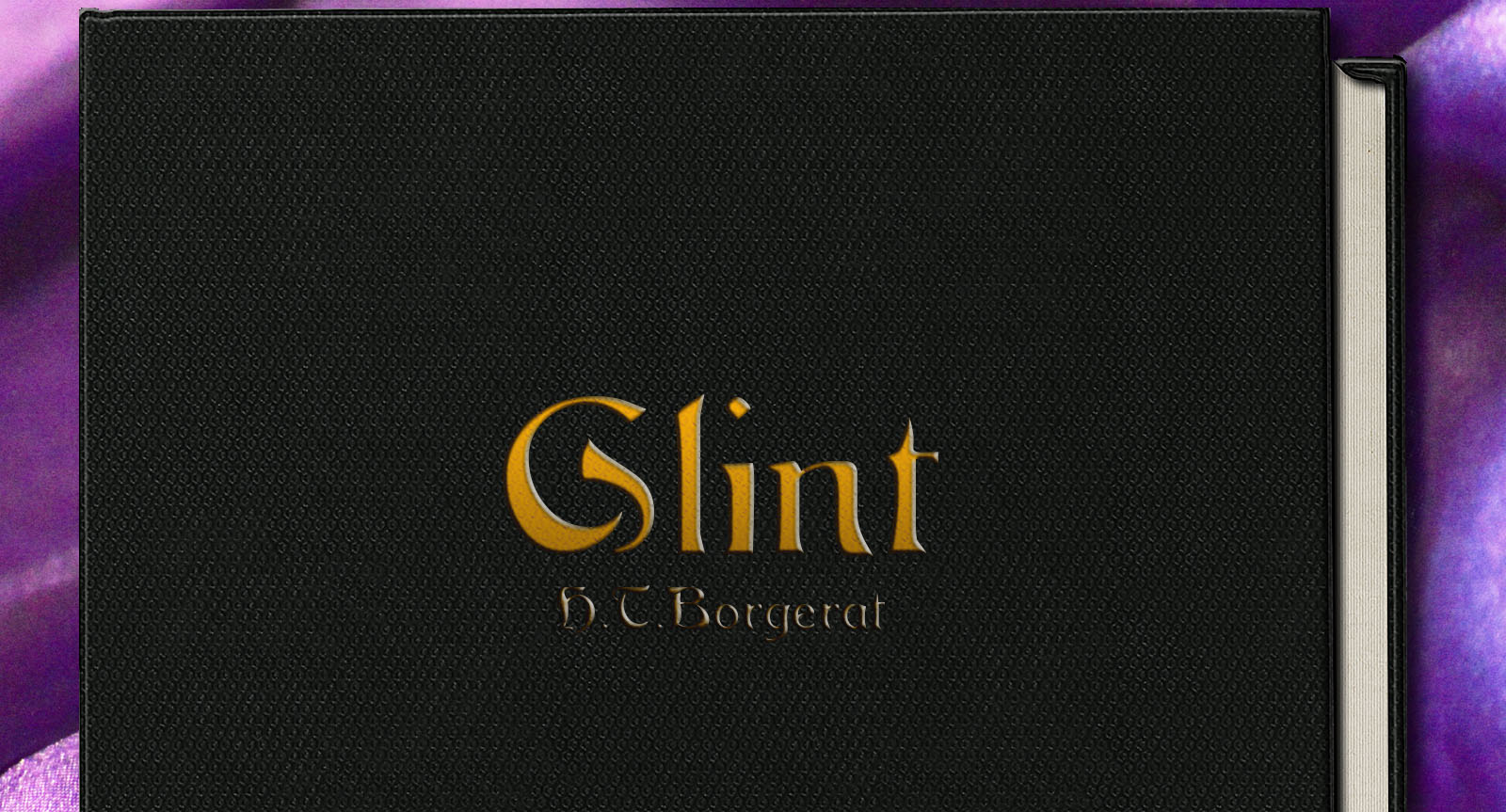Glint, by Heinrich Thadeus Borgerat
Vinclav was a powerful animancer who lived in the 4th century of the Age of the Iron Divide. He traveled across the Ocean Belt tricking people out of their souls using a powerful key-shaped artifact he had created. After 200 years of terror following in his wake, he finally perished at sea, but his legend had become immortal by then. Pirates cursed his name and warded themselves against the evil they thought he imposed on them, and in the year 132 of the Age of Awakening, the famous poet and author Heinrich Thadeus Borgerat wrote an influential work called “Glint” that portrays Vinclav in a new but still quite sinister light. This work lead to the new religious waves in that era, causing the emergence of the Church of Pure Souls.
Here are the first scenes of Borgerat's Glint in abridged form with commentary by Jeremy Winterweiss from the 920 GE reprint. The figure of Vinclav as the Church of Pure Souls portrays it has been strongly influenced by this work, and plays of it are often held or sponsored by local chapters.
SCENE: In a Place Beyond Mortal Ken[1]The way this scene is set up has been subject to a long process of evolution, usually being a reflection of the zeitgeist that signifies the corresponding period. Records of old Guantil-ya plays from the Age of Awakening are said to have used a lot of steam to obscure the stage, having Vinclav and Sanatana step to the front of the stage in alternation to become visible to the audience, while the contemporary staging by Johan Vandervelt in 919 GE went with painted sets of surreal landscapes while deliberately producing noises reminiscent of clockworks and machinery with choirs providing subtle backup.
- J. Winterweiss
SANATANA. What excellent and fine design
That one may find within this place:
Each cog and wheel a clever rhyme
With golden light upon its face.
I see the souls of mortal men
Beyond the veil that masks this world.
Though they may toil time and again,
What wondrous strive becomes unfurled![2]While most Yamato philosophers and Clockwork Seekers of old have agreed that the thing the Clockwork most appreciates in human beings is their capacity for “desire”, the Church of Pure Souls claims that there is a fundamental division between worldly and spiritual desires, the worldly being the domain of Vinclav, the spiritual the domain of Sanatana, who is the avatar of the Great Clockwork. In the eyes of the church, it is the human struggle against their lower desires that makes them worthy of the divine.
- J. Winterweiss
But harken now, I do digress,
For I speak not into the wind!
Hide not inside the emptiness,
And speak to me, the one within!
VINCLAV (stepping forth).[3]It is unclear whether Borgerat initially intended for the play to be performed on stage since he never officially commented on this, but his lackluster stage directions have led to a variety of fascinating interpretations. For example, Bruiner in 48 AH had Vinclav enter not through the steam, as so many directors had before him, but revealed him as a member of the audience that had sat among the ranks in disguise, who at this point in the play stands up and walks on stage. Brilliant.My master, surely you think not
- J. Winterweiss
That I would hide beyond your sight.
Your view is ever in my thought,
And by my form it would be soiled.
SANATANA. Quiet, knave! Your sharpened tongue
May well cut deep in mortal ears
And make them serve you before long,
But I am older than the years!
VINCLAV. Never, I meant disrespect
to one so great and true.[4]In many performances the Vinclav actors will turn to the audience here in a conspiratorial way, attempting to better frame the defiance they cleverly hide in this line that, when spoken, sounds harmless. I still recall seeing the famous Vinclav actor Heros Mantala on stage, saying that “never” almost shocked to Sanatana, then turning to the audience with a brilliant, sly smile and a wink.
- J. Winterweiss
The harmony you did perfect
Does credit onto you!
Though tell me do you not distress
At humans as they make their steps?
At humans heaping their regrets?
At souls in truly cold and cruel
Melancholy-woven nets?
SANATANA. You speak as one who does not know
The power of the human soul,
Oh, war will man, and suffer down below,
But always will he come here whole.
No sadness, horror, or distress
Can touch that mighty spark
And when it floats onto my breast
I’ll kiss away the dark![5]This concept is one of the reasons that the church has such disdain for blighters and magic, thinking that they lessen this ‘mighty spark’.
- J. Winterweiss
VINCLAV. Never, then it must be so;
But I am one to lark.
I hear the words but do not know:
Can nothing harm this spark?
I saw the wickedness of man
Reflected in their eye,
And if a soul they carry then,
it may just crack in time.
SANATANA. Verily, then be my guest,
Oh shyster clad in ashen garb.
And I know one who won’t protest
To be the object of your lark.
Do you know Glint?
VINCLAV. Doctor Glint of Guantil-ya?
She surely has no hint…
SANATANA. My bright and faithful star.
Yes, ever has this one amused:
A scholar so she was ordained,
And praises on her quite profuse
Have all her peers ever proclaimed.
And sciences are not enough
To sate her mental appetites;
She longs to know the very stuff
From which my cogs and gears arise.
VINCLAV. Oh, now I see, she means to build
A thing that she already has!
And do I not possess a key just for that ilk…
The bet is fair and I say yes!
SCENE: A Lecture Hall in the Van Maxwell School of Logic and Sciences
STUDENT ONE. As ever we are in the thick
Of all too strange arithmetic.
How did the work go for you then?
STUDENT TWO. It was beyond my feeble ken…
Such exercise seems ill advised
For minds so underutilized.
STUDENT THREE. Perhaps you should not speak so loud
When you proclaim yourself as cowed.
Surely, you are in this class
With some idea of calculus!
STUDENT ONE. Yes, such we have, don’t mock us, friend,
I know the tables of Tarîn, the axioms of Bertelsten,
And years I studied every trick
Of glorious arithmetic!
STUDENT TWO. But oh the Doctor, what a mind!
Without ever breaking form, is esoteric’ly inclined.
Her thoughts are trapped in higher spheres
And we are trapped quite firmly here.
STUDENT THREE. And if she is, that means the game
Is then for us to do the same -
As researchers to find her wrongs…
STUDENT ONE. Careful now, here she comes![6]This part is heavily abridged and contains a lot of exposition and descriptions of the lecture hall and the university in the unabridged version.
- J. Winterweiss
GLINT. To the front now pass your papers,
I shall find fault with them later.
For now you will find some elation
In closely scanning this equation.
STUDENT THREE. A unit from no written set!
GLINT. No formulary has it yet.
Still, work with it, by my coercion,
Look here, make use of this conversion.
(to herself).[7]This stage direction is usually taken as “to the audience”.Show me what you all can find
- J. Winterweiss
And exercise your child-like minds.
I’ll gladly look in any place
For vestiges of human grace…
STUDENT ONE. Oh no, I still don’t understand,
The lesson almost at its end!
And blank the sheet here on my desk.
STUDENT THREE. Well, did you do your very best?
It was not past my intellect.
GLINT. Well, let me be the judge of that.
Now off you go, I will collect
The papers put onto your desks.
(After the students have left). Child-like indeed! I spy no skill,
Just wasted paper, ink, and quill!
But what is this? I shall decree
Some merit here with student three…
A novel thought I may employ
And find results quite to my joy.
Now to my office, I hope to find
The parcel from my hapless knight.
SCENE: In Dr. Glint’s office.
GLINT. Now let us see if all is right:
The still, the magic manifold,
The sigil of the night,
And metal gears of solid gold…[8]In the unabridged version, the description Glint provides paints a much fuller picture of her office that has all the markings of a laboratory. As a young boy I remember being enchanted by the amazing set pieces of Vandervelt Senior’s staging of this play. Each item on the stage was an authentic piece of alchemist’s equipment, borrowed from various friends and contacts, sometimes bought with prime seats. I only later learned how much Vandervelt’s father sacrificed to realize his vision of making the Aerialis Grand Theater what it is today.
- J. Winterweiss
But not my parcel, drat!
YORGEN. Doctor, do not fret!
Your faithful Yorgen has arrived,
And here the thing I have contrived.[9]The portrayal of Yorgen is one of the most widely varied ones among different directors. Some make their acting choice to make him look ‘hapless’ as claimed by Glint, often slightly disfigured or hunched, appearing as a lesser person compared to the perfect Doctor, while others chose a less crass approach and some portray him in a more flattering light.
- J. Winterweiss
GLINT. Inventor Yorgen, what relief,
Your sight, indeed, is a reprieve!
And oh the parcel, as requested,
My faith in you was well invested.
Now let me see the installation
Made possible by my equation.
YORGEN. A devilish tricky thing to build,
But I am clever and quite skilled.
I bent the gold in five dimensions
And from a soul I added dusts,
Which should serve well for form retention:
Within the real it will not rust.
Where you get such ethereal stuff
Like this, I think I know enough
To make my guesses close.
GLINT. Try not to lose your nose,
When you start sticking it in here.
But if this works, I’ll buy the beer.
YORGEN. Now this I do enjoy to hear;
I ever liked the taste of beer.
But even more so I request
The company that you suggest.
GLINT. Let it be so when I am done,
Inventor, the sooner you are gone
Now, the sooner we shall meet again.
YORGEN. It is my pleasure to leave you then.
GLINT (now alone). So tiresome, this old buffoon,
I hope to cut him loose quite soon.
This parcel holds the final means
For that, the king of the machines!
Within I see as bright as fate,
The framing for a golden gate!
Small perhaps, a book in size,
Such is the price of compromise.
Now let me set the wings in there
That I have made from many souls.
Oh, and the frame, if I do stare,
Makes all grow black as dirty coals!
Though it is naught for me to worry,
Did I not every cautiously
Pick animals to bring no folly
Down on my name and onto me?
There, now the gate is built;
And eerily it stands.
The world that is revealed
Shall soon heed my commands!
What is this? It will not open up!
Even if I pull and drag,
Even when my wrench has struck
It, or my metal sprag!
SCENE: In the lowest reaches of a place beyond ken.
VINCLAV. Well this is rather disappointing,
The quality of souls is poor,
If this is where the gate is pointing.
I’ll place a carpet of velour.
A primly dressed one such as me,
Should not just soil his little feet,
And small they have to be indeed
This gate before me is petite.
Well, out I go, here is the key,
I keep it deep inside my coat
With every other one that be
I pass through door and wall and moat.[10]To protect themselves from Vinclav’s all-defying key, believers of the Church of Pure Souls often paint little signs of the fifteen-toothed gear on each wall and door of their houses.
- J. Winterweiss
(Stepping through the gate and onto Dr. Glint’s desk).[11]Now the presentation of this bit is very dependent on stage technique and budget. I have seen amazing performances where actors stood far apart from each other using perspective illusions to make this work, but also shows where skilled mages of fire or lightning caused illusions of light to create a tiny apparition of Vinclav to walk on the desk. In one show I visited in a small town on the Hooper Chain, a marionette was used to great effect.Madam, I pull my hat before thee,
- J. Winterweiss
What a feat you have performed!
You built this gate to come and see me;
I do say that my heart is warmed.
SCENE: In Dr. Glints office.
GLINT. Perhaps I should consult my peers…
But no, it opens! By the gears!
VINCLAV. Now, now these words; there is no need…[12]Generally, a good Vinclav actor, puppeteer, or projector will capture the essence of this sentence by flinching at the name of the Great Clockwork, but again, this depends on the manner in which he is portrayed during this ‘tiny escapade’.
- J. Winterweiss
GLINT. A little man that walks and speaks?!
From realms unknown onto my desk
You step; the fruit of my first test?
Are you by chance my own creation;
born of synthetic generation?
VINCLAV. Now that is hubris I enjoy;
Though, I could be in your employ.
Just let me first – yes, lock this gate
There, back to its original state.
GLINT. The gate! But you have closed it shut!
You miserable, foolish clod!
Who are you that you’d take my prize?![13]I have always greatly enjoyed this bit on how Vinclav brings Glint so close to the fulfillment of her life’s desire, then casually smashes it in front of her, following up with a chilling introduction that I can recite from heart to this day. Preachers of the Church of Pure Souls also enjoy reading his following part to their flocks to instill the fear of Vinclav in them…
- J. Winterweiss
VINCLAV. I am the king of keys and lies.
For all you humans' faith and trust
Is meant to crumble into dust.
Thus all you think is bad and sin
Are qualities that sleep within,
Are me, the master of the mire:
Manifestation of desire.
GLINT. You’re… the deceiver! Vinclav of yore!
From long forgotten pirate lore!
VINCLAV. Forgotten not by you it seems,
The learned Glint, oh how she gleams…
But now it’s time to grow to size
I’m more akin to man than mice.[14]Again, this special effect has been staged in many ways. I have no specific preference to offer.
- J. Winterweiss
GLINT. And there you go, all tall and grown!
There’s no such spell in scroll or tome!
So, Have you come to take my soul?
As shanties say has been your goal?
VINCLAV. We’ll see, I am quite undecided,
It is the gate that you provided
That sparked my curiosity;
So quell your animosity.
I think we might be quite well matched:
Two kindred spirits walk the edge
And ever seek to grasp the soul,
To quantify the greater whole.
GLINT. And you would take me for a fool
That throws her own into your pool?
You think I hold such low regard
For this my own immortal spark?
VINCLAV. Perish the thought!
I’d deal for naught.
I have a better wager, see,
One for this little, golden key…
GLINT. The key you used to lock the gate!
VINCLAV. It opens all the doors of fate.
GLINT. A prize I should like well indeed…
But what’s the wager that you seek?
VINCLAV. Your gate has led me to the world;
Since olden days, much has occurred…
There’s too much work, yes far too much
For me alone to handle such.
So come with me, see Aqualon;
To splendid places come along!
The secrets of the world we’ll free
And once we’re done, you’ll have the key.
GLINT. That seems quite fair, but I’m no fool,
Over mine eyes you’ll pull no wool;
I name thee shyster! My attention
Did not let slip: no time was mentioned!
VINCLAV. A minor error on my side,
We’ll make it years, say, three by five.
GLINT. That is no stroll but a career;
Yet I have worked much longer here
To forge this gate and pierce the veil,
So for the key: yes. I won’t fail.[15]This act has become popularized after Borgerat as a “Glintian Wager”, one where one figuratively “makes a deal with Vinclav”, implicitly giving up parts of their soul, humanity, or human dignity for power. It has been picked up in many pieces of literature and poetry since.
- J. Winterweiss
VINCLAV. Then so be it, the deal is done!
And by the morrow, we’ll be gone.
Pack all the things you think you’ll need,
My doctor, and then sign this deed…









I'm not familiar with plays, but shouldn't the name be ended by a : instead of a .? I'm going to have to read this a few times to figure out something more constructive then that, but the detail and work that went into this is very impressive! I liked it a lot: "To forge this gate and pierce the veil" is just my kind of jam.
Creator of Araea, Megacorpolis, and many others.
Glad you enjoyed it ^-^ I don't know if this is a standard for plays in general, but the German play/book by which this story was heavily inspired is "Faust" by Goethe, and this is how it is written in my copy of that.